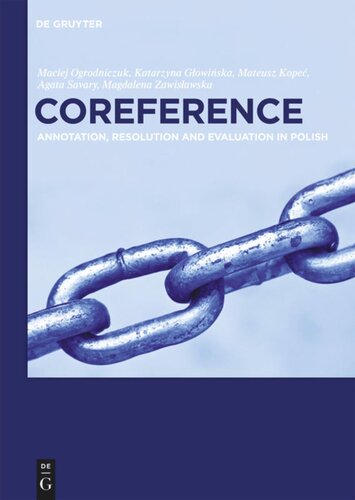

Most ebook files are in PDF format, so you can easily read them using various software such as Foxit Reader or directly on the Google Chrome browser.
Some ebook files are released by publishers in other formats such as .awz, .mobi, .epub, .fb2, etc. You may need to install specific software to read these formats on mobile/PC, such as Calibre.
Please read the tutorial at this link: https://ebookbell.com/faq
We offer FREE conversion to the popular formats you request; however, this may take some time. Therefore, right after payment, please email us, and we will try to provide the service as quickly as possible.
For some exceptional file formats or broken links (if any), please refrain from opening any disputes. Instead, email us first, and we will try to assist within a maximum of 6 hours.
EbookBell Team

0.0
0 reviews‘Coreference’ presents specificities of reference, anaphora and coreference in Polish, establish identity-of-reference annotation model and present methodology used to create the corpus of Polish general nominal coreference. Various resolution approaches are presented, followed by their evaluation. By discussing the subsequent steps of building a coreference-related component of the natural language processing toolset and offering deeper explanation of the decisions taken, this volume might also serve as a reference book on state-of the art methods of carrying out coreference projects for new languages and a tutorial for NLP practitioners.
Apart from serving as a description of the fi rst complete approach to annotation and resolution of direct nominal coreference for Polish, this book is a useful starting point for further work on other types of anaphora/coreference, semantic annotation, cognitive linguistics (related to the topic of near-identity, discussed in the book) etc. With extended tutorial-like sections on important subtopics, such as evaluation metrics for coreference resolution, it can prove useful to both researchers and practitioners interested in semantic description of Balto-Slavic languages and their processing, engineers developing language resources, tools and linguistic processing chains, as well as computational linguists in general.